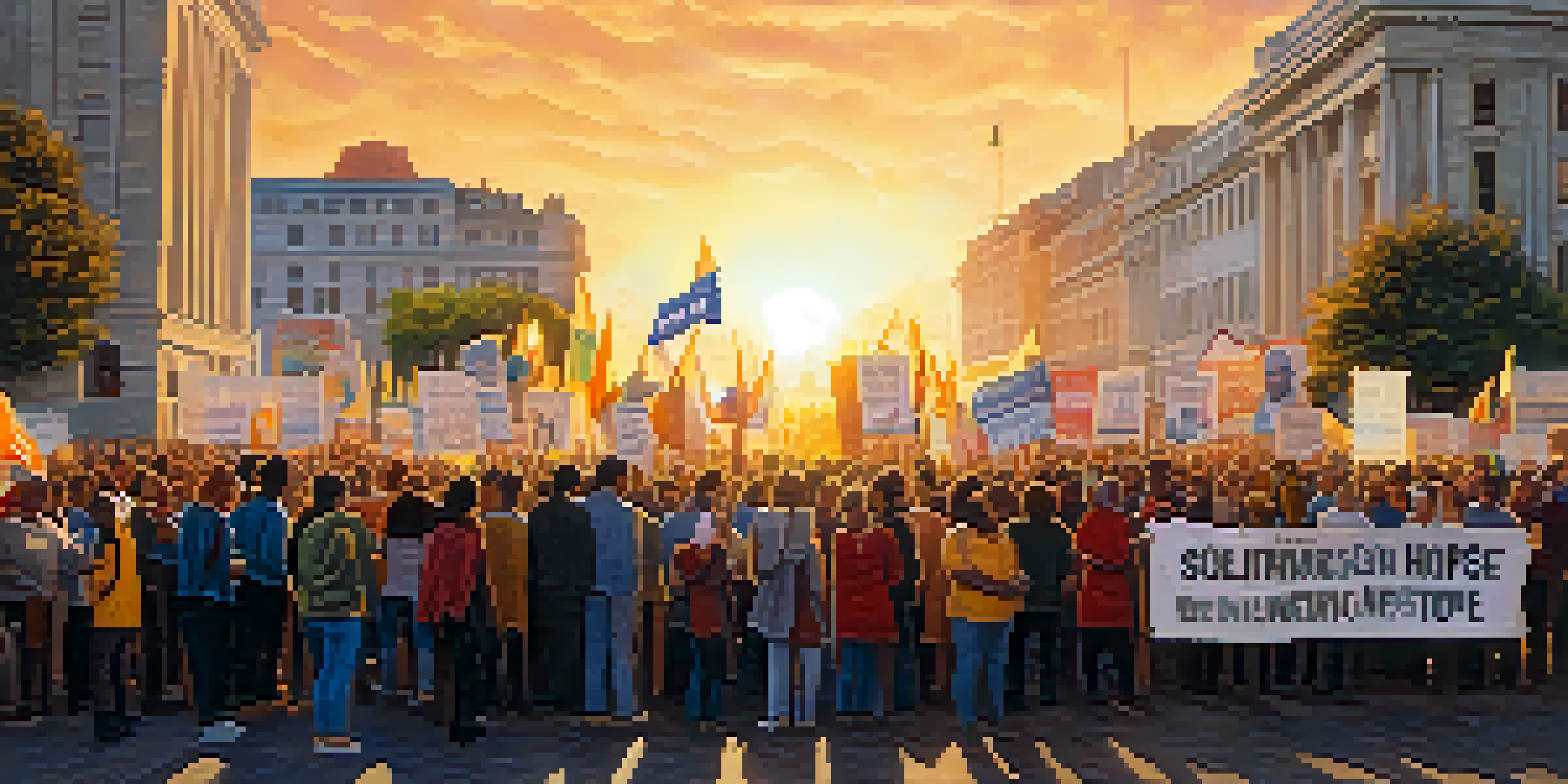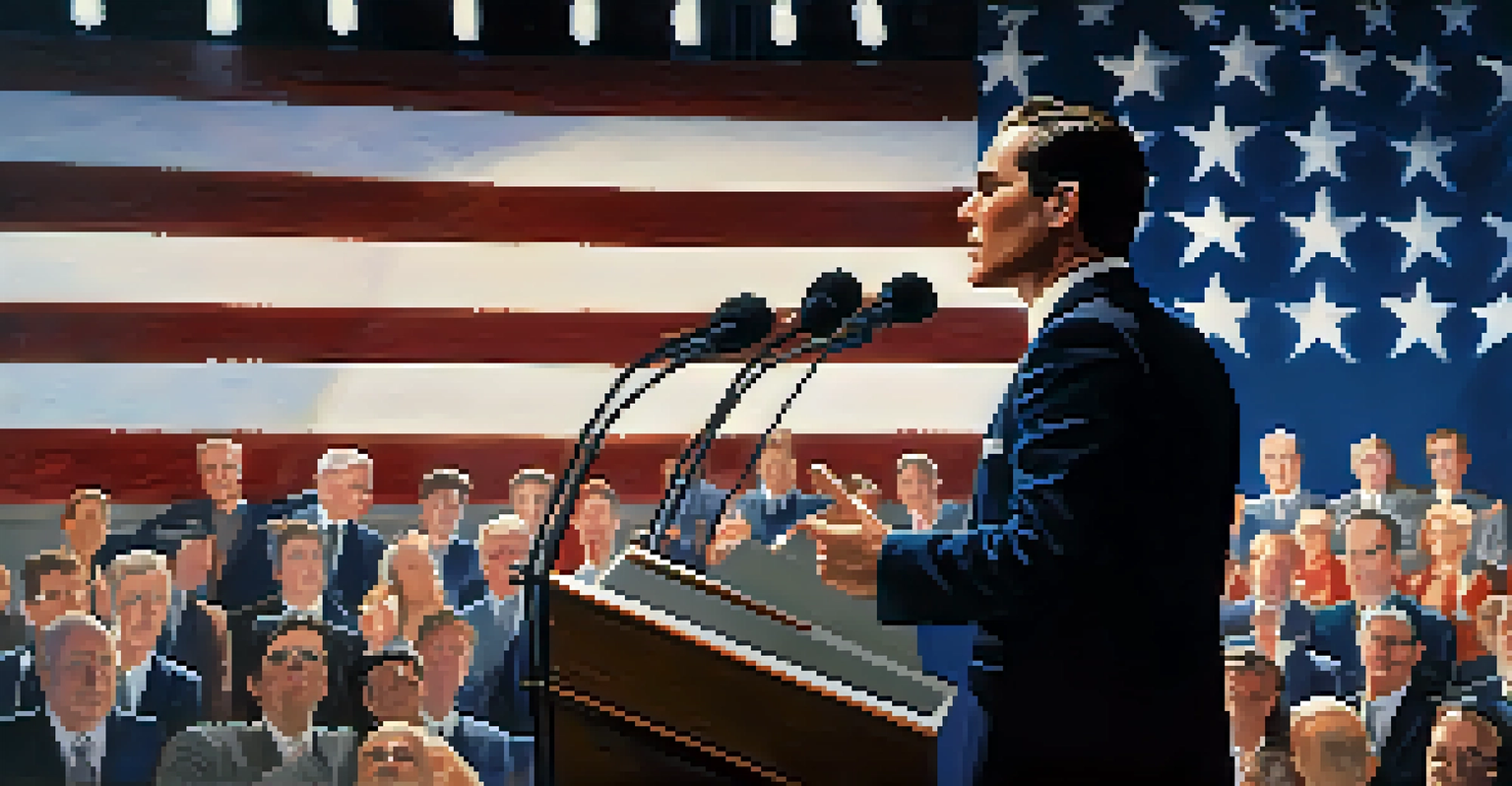The Intersection of Film and Politics in Modern Society

The Role of Film as a Political Commentary Tool
Film has long been a powerful medium for political commentary, often reflecting societal issues and influencing public opinion. From classic films like 'All the President's Men' to modern documentaries addressing climate change, cinema serves as a mirror to our political landscape. These narratives not only entertain but also provoke thought and discussion about critical issues facing society today.
Film is a battleground for the truth, where the struggle for justice is played out on the screen.
By presenting complex political themes in a digestible format, films can engage audiences who might otherwise be disinterested in politics. For example, movies like 'The Hunger Games' explore themes of oppression and rebellion, resonating with younger viewers. This ability to simplify and dramatize political concepts makes film an effective tool for raising awareness and stimulating dialogue.
Related Resource
Moreover, films can evoke emotional responses that inspire action, making viewers feel connected to the political issues at hand. When audiences see relatable characters grappling with real-life challenges, it humanizes abstract concepts, driving home the importance of civic engagement and activism.
Historical Context: Film and Politics Through the Ages
The relationship between film and politics isn't new; it has roots that stretch back to the early days of cinema. Silent films often depicted social issues, while World War I and II saw propaganda films used to rally support for national causes. These historical contexts laid the groundwork for how film would later be used as a political tool, shaping public perception and attitudes.

As the decades progressed, filmmakers began to leverage their platforms to challenge the status quo. Movies like 'Dr. Strangelove' satirized the absurdity of nuclear warfare, while 'Selma' highlighted the civil rights movement. Such films serve as reminders of the transformative power that cinema holds in addressing significant political events and movements.
Film as Political Commentary
Films serve as a powerful medium for political commentary, engaging audiences with complex themes while provoking thought and discussion.
This historical interplay continues to influence contemporary filmmaking, where directors often draw inspiration from past political struggles. By referencing historical events, filmmakers create a sense of continuity, reminding audiences that the fight for justice and equality is ongoing and relevant.
The Power of Documentary Films in Shaping Politics
Documentary films have emerged as a significant force in political discourse, providing a platform for underrepresented voices and issues. Unlike traditional narratives, documentaries aim to present factual accounts, often revealing truths that mainstream media may overlook. This commitment to authenticity allows viewers to engage with real-world issues on a deeper level.
The power of film is that it can change the way we see the world; it can challenge our beliefs and inspire action.
For instance, films like '13th' and 'Won't You Be My Neighbor?' address systemic racism and social justice, encouraging audiences to confront uncomfortable realities. By highlighting personal stories within broader political contexts, these documentaries foster empathy and understanding, prompting viewers to take action.
Related Resource
Additionally, documentaries can influence public policy by bringing attention to critical issues. Policymakers often respond to the narratives presented in these films, as heightened public awareness can lead to increased pressure for change. As a result, documentary filmmaking has become an essential tool for activism and advocacy.
How Film Influences Political Campaigns and Elections
In today's digital age, film is not just an art form; it has become a strategic asset in political campaigns. Candidates use film to craft their images, share their messages, and connect with voters on an emotional level. Campaign ads often resemble short films, blending narrative techniques with persuasive messaging to capture attention.
Moreover, the rise of social media has transformed how political content is shared and consumed. Viral videos can catapult a candidate into the national spotlight, making film an indispensable tool for modern political engagement. For instance, clips from debates or campaign rallies can be edited into compelling narratives that resonate with voters.
Documentaries Drive Change
Documentary films play a crucial role in shaping political discourse by presenting factual accounts that inspire empathy and prompt action.
However, the use of film in campaigns also raises questions about authenticity and manipulation. As candidates curate their images through carefully crafted visuals, voters must navigate the blurred lines between reality and representation. This dynamic underscores the importance of critical media literacy in understanding the political landscape.
Cinematic Representations of Political Figures
The portrayal of political figures in film can have a lasting impact on public perception. Biopics and dramatizations often shape how audiences view historical figures, influencing their legacy long after they've left office. For example, films like 'Lincoln' and 'The Butler' offer nuanced portrayals that can either elevate or diminish a politician's reputation.
These cinematic narratives can simplify complex personalities into digestible stories, often focusing on key moments that define their careers. While this can make for compelling storytelling, it can also lead to oversimplification, where the intricacies of a figure’s life and decisions are lost. Audiences must approach these films with a discerning eye, recognizing the artistic liberties taken.
Related Resource
Furthermore, the way filmmakers choose to depict political figures reflects societal values and biases. The lens through which a character is viewed can shape audience opinions, revealing much about the cultural context of the time. As such, understanding these representations is crucial for grasping how film influences political narratives.
The Global Influence of Political Cinema
Political cinema isn't confined to Hollywood; it has a global presence that influences societies around the world. International films often tackle local political issues, providing insights into different political landscapes. For instance, films like 'City of God' from Brazil or 'The Lives of Others' from Germany address themes of corruption and surveillance, resonating with audiences in their respective contexts.
These films can foster cross-cultural understanding by exposing viewers to diverse political struggles. As audiences engage with stories from around the globe, they gain a broader perspective on issues such as democracy, human rights, and freedom of expression. This cultural exchange is vital in an increasingly interconnected world.
Global Impact of Political Cinema
Political cinema transcends borders, fostering cross-cultural understanding and inspiring movements by addressing local and global political issues.
Moreover, global political cinema can inspire movements and activism, as stories of resilience against oppression resonate universally. The impact of films like 'Parasite' or 'Roma' goes beyond entertainment, sparking discussions about class disparity and identity. By highlighting these themes, filmmakers contribute to a more nuanced understanding of global politics.
The Future of Film in Political Discourse
As technology evolves, so does the landscape of film and its role in political discourse. Streaming platforms have democratized access to films, allowing diverse voices to be heard and challenging traditional gatekeepers. This shift presents new opportunities for filmmakers to address pressing political issues, reaching wider audiences than ever before.
Additionally, the rise of virtual reality and interactive storytelling offers exciting possibilities for immersive political narratives. These innovative formats can engage audiences in ways that traditional film cannot, fostering a deeper connection to the subject matter. Imagine experiencing a documentary that places you in the midst of a protest, allowing you to feel the urgency of the moment.

However, with these advancements come challenges, particularly in maintaining factual integrity. As misinformation spreads rapidly online, filmmakers must navigate the responsibility of presenting accurate information while engaging audiences. The future of film in political discourse will depend on balancing creativity with a commitment to truth.